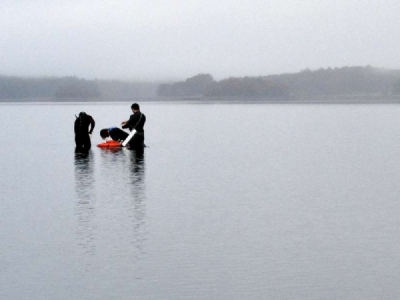
Posted on February 23, 2020
FILE – In this Oct. 29, 2019, file photo, University of New Hampshire scientists monitor the health of seagrass in the Great Bay in Durham, N.H. Federal officials got an earful of complaints Wednesday night, Feb. 19, 2020, from scores of New Hampshire communities over a plan to further reduce nitrogen in one of the largest estuaries in the Northeast.
PORTSMOUTH, N.H. (AP) — Federal officials got an earful of complaints Wednesday night from scores of New Hampshire communities over a plan to further reduce nitrogen in one of the largest estuaries in the Northeast.
In the draft Clean Water Permit for the Great Bay in New Hampshire, the Environmental Protection Agency would allow a dozen communities to keep nitrogen levels from their wastewater treatments at current levels. In exchange, the communities have agreed to follow a 23-year state plan that calls for a 45% reduction in nitrogen from other nonpoint sources like storm water runoff and taking more residents off septic tanks.
The communities said they support a goal of improving the health of the bay, which has seen an increase in algae blooms and decline in eelgrass beds by 80% since the 1990s. Eelgrass beds are important because they have been found to provide food and shelter for fish, shellfish and sea turtles. They also reduce coastal erosion and keep the water clean by filtering out excessive nutrients.
Seven rivers carry pollution from 52 communities in New Hampshire and Maine into the 1,020-square-mile (2,650-square-kilometer) watershed for the bay.
Most communities have significantly reduced the amounts of nitrogen going into the bay through water treatment plant upgrades that have cost tens of millions of dollars. They argued further reductions proposed in the permit would be too costly and, in some cases, impractical. Rochester, for example, projects its reductions would cost $400 million and, in some cases, require changes in state law.
“It’s my understanding that the nonpoint nitrogen reductions the EPA is asking for is unnecessarily restrictive, not supported by science and not realistically achievable.” Dover City Council member John O’Connor told the public hearing. “I don’t know how you are supposed to control nonpoint sources. This is private property.”
Other municipal officials complained the permit would require them to take action while allowing another 40 communities around the bay off the hook. They also complained the reductions would limit their potential to grow, unfairly impact private property owners and were based on questionable science. They want the EPA to conduct a peer review to confirm the proposed reductions are applicable to the Great Bay.
“The permit does not seem to recognize the difficulty and consequently the cost of removing nitrogen from stormwater,” Portsmouth Deputy City Attorney Suzanne Woodland said. “It is not cheap to remove nitrogen from stormwater.”
But environmentalists were cautiously optimistic that the EPA permit could further reduce nitrogen into the bay, noting there still is three times more nitrogen going into the watershed than is considered healthy. They said the reductions were not as costly as some communities portrayed them and the limits achievable.
Still, they argued the permit does not go far enough. They want far lower nitrogen limits than are being proposed and enforceable deadlines for the communities to implement their plans.
“We view this as an innovative approach that has the potential to kick off the next critical chapter in restoring the health of the Great Bay estuary,” Melissa Paly, Conservation Law Foundation’s Great Bay–Piscataqua Waterkeeper, said. “Though we have begun to make progress and we’ve heard about that progress from many communities with some very significant upgrades to water treatment plants around the estuary, we know we have a lot more work to do.”
Peter Drummond, a fishing guide from Kittery Point, Maine, who also designs septic tanks, said he understands these upgrades required to meet the permit limits might mean higher taxes for property owners. But he said it would be worth it if that means the waterways he spends so much time on would continue to recover.
“I would urge these communities to make these upgrade,” he said. “I feel like we are playing catch-up to get nitrogen levels down to where they should be. … This is very important to me. I urge you to continue going in the right direction.”
Source: thehour.com





